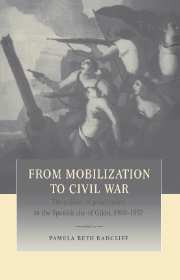Book contents
- Frontmatter
- Contents
- List of maps
- List of tables
- Acknowledgments
- Glossary of terms and abbreviations
- Introduction
- 1 A turning point: the city in 1900
- PART I Patterns of life in working-class Gijón
- PART II Institutional forces of opposition: republicans and anarchosyndicalists
- PART III Defining an oppositional culture: the struggle over the public sphere
- PART IV The urban battlefield: conflict and collective action, 1901–1936
- Conclusion
- Appendix 1 Wage and price movement
- Appendix 2 Occupations by status category
- Appendix 3 Supplementary tables
- Select bibliography
- Index
PART II - Institutional forces of opposition: republicans and anarchosyndicalists
Published online by Cambridge University Press: 31 October 2009
- Frontmatter
- Contents
- List of maps
- List of tables
- Acknowledgments
- Glossary of terms and abbreviations
- Introduction
- 1 A turning point: the city in 1900
- PART I Patterns of life in working-class Gijón
- PART II Institutional forces of opposition: republicans and anarchosyndicalists
- PART III Defining an oppositional culture: the struggle over the public sphere
- PART IV The urban battlefield: conflict and collective action, 1901–1936
- Conclusion
- Appendix 1 Wage and price movement
- Appendix 2 Occupations by status category
- Appendix 3 Supplementary tables
- Select bibliography
- Index
Summary
The combination of political torpor and economic and social dynamism that characterized late-nineteenth-century Gijón soon gave way to open confrontation. As the political culture of confrontation developed, the nascent oppositional traditions of the nineteenth century blossomed into full-fledged challenges to the old regime. In the realm of formal institutional politics, two main groups, the republican parties and the labor movement, led the attack on the Restoration system, each vying to define an oppositional politics that could unite the people of Gijón in battle against the establishment. Through different forms of rhetoric and organization, each sought and claimed to represent the interests of the new Gijón created by the processes of urbanization and industrialization. They both spoke a populist language of empowerment directed at the Gijón “darkened by smoke,” the working classes and the new barrios on the margins of the city.
But the vision that each articulated was quite different. Republicans spoke about orchestrating the integration of the masses into a reformed political system that would erase the barriers between El Llano and the Calle Corrida. Anarchists and Socialists, on the other hand, spoke about polarization; their scenario called for the residents of El Llano to occupy the Calle Corrida, not make peace with it. Following the implications of these contrasting populist languages, each group worked through different institutional channels. In order for the republicans' vision of integration to be realized, they had to overhaul the governmental institutions to make them effective conduits for social and economic reform. Thus, much of the local republicans' energies were directed at the conquest and reform of the government, particularly at the municipal level.
- Type
- Chapter
- Information
- From Mobilization to Civil WarThe Politics of Polarization in the Spanish City of Gijón, 1900–1937, pp. 115 - 117Publisher: Cambridge University PressPrint publication year: 1997

